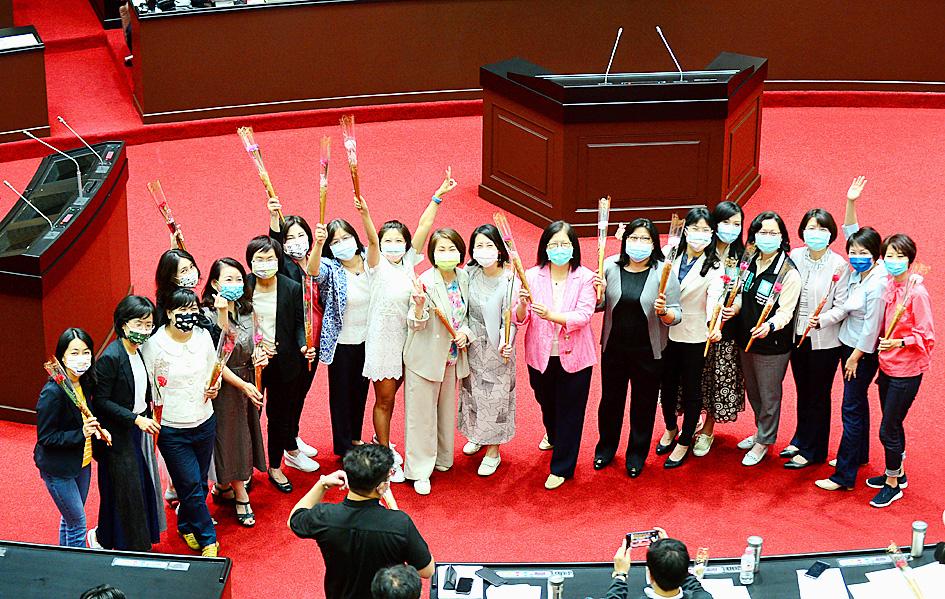Taiwan leads East Asian countries in gender equality of legislatures with the highest ratio of female to male lawmakers, the Executive Yuan’s Gender Equality Committee (GEC) said in a statement yesterday.
Female lawmakers in Taiwan accounted for 41.6 percent of the Legislative Yuan in 2020, and rose to 42.5 percent this month, when Democratic Progressive Party Legislator Lin Ching-yi (林靜儀) won a legislative by-election in Taichung’s second district, the committee said.
The updated figure is a new record and places Taiwan ahead of other countries in Asia, including Singapore and South Korea, the committee added.

Photo: Wang Yi-sung, Taipei Times
The United Arab Emirates has the highest proportion of female lawmakers in Asia (50 percent), and the third-highest in the world, the committee said in its report titled Gender At A Glance in the Republic of China (Taiwan), which it released yesterday.
Aside from an increase in female lawmakers, the proportion of female judges and the proportion of female ministers without portfolio have exceeded 50 percent, the report said.
In 2020, Taiwan also recorded the highest rate of female participation in the workforce in a decade among women aged 45 to 64 — 52.3 percent — while the percentage of women of all ages in the labor force rose by 1.5 percentage points to 51.4 percent from 2010 to 2020, it said.
During the same period, the percentage of men in the labor force rose 0.7 percentage points to 67.2 percent, it added.
In 2020, the average wage gap between male and female workers was 14.8 percent, 0.1 percentage points lower than a year earlier, it said.
However, gender bias remains prevalent in industries historically dominated by men, it said.
For example, in the construction industry, the percentage of registered female architects who applied to open their own firms was 8.46 percent, it said.
Further education and improvement in “personal safety and justice” are also needed, the report said, adding that females were victims in 80.4 percent of the 9,212 sexual assault cases reported in 2020.
Since 2020, the percentage of sexual assaults with female victims has increased, with 70 percent of sexual harassment and assault cases on school campuses involving women, it said.

Taiwan has received more than US$70 million in royalties as of the end of last year from developing the F-16V jet as countries worldwide purchase or upgrade to this popular model, government and military officials said on Saturday. Taiwan funded the development of the F-16V jet and ended up the sole investor as other countries withdrew from the program. Now the F-16V is increasingly popular and countries must pay Taiwan a percentage in royalties when they purchase new F-16V aircraft or upgrade older F-16 models. The next five years are expected to be the peak for these royalties, with Taiwan potentially earning

STAY IN YOUR LANE: As the US and Israel attack Iran, the ministry has warned China not to overstep by including Taiwanese citizens in its evacuation orders The Ministry of Foreign Affairs (MOFA) yesterday rebuked a statement by China’s embassy in Israel that it would evacuate Taiwanese holders of Chinese travel documents from Israel amid the latter’s escalating conflict with Iran. Tensions have risen across the Middle East in the wake of US and Israeli airstrikes on Iran beginning Saturday. China subsequently issued an evacuation notice for its citizens. In a news release, the Chinese embassy in Israel said holders of “Taiwan compatriot permits (台胞證)” issued to Taiwanese nationals by Chinese authorities for travel to China — could register for evacuation to Egypt. In Taipei, the ministry yesterday said Taiwan

Taiwan is awaiting official notification from the US regarding the status of the Agreement on Reciprocal Trade (ART) after the US Supreme Court ruled US President Donald Trump's global tariffs unconstitutional. Speaking to reporters before a legislative hearing today, Premier Cho Jung-tai (卓榮泰) said that Taiwan's negotiation team remains focused on ensuring that the bilateral trade deal remains intact despite the legal challenge to Trump's tariff policy. "The US has pledged to notify its trade partners once the subsequent administrative and legal processes are finalized, and that certainly includes Taiwan," Cho said when asked about opposition parties’ doubts that the ART was

If China chose to invade Taiwan tomorrow, it would only have to sever three undersea fiber-optic cable clusters to cause a data blackout, Jason Hsu (許毓仁), a senior fellow at the Hudson Institute and former Chinese Nationalist Party (KMT) legislator, told a US security panel yesterday. In a Taiwan contingency, cable disruption would be one of the earliest preinvasion actions and the signal that escalation had begun, he said, adding that Taiwan’s current cable repair capabilities are insufficient. The US-China Economic and Security Review Commission (USCC) yesterday held a hearing on US-China Competition Under the Sea, with Hsu speaking on